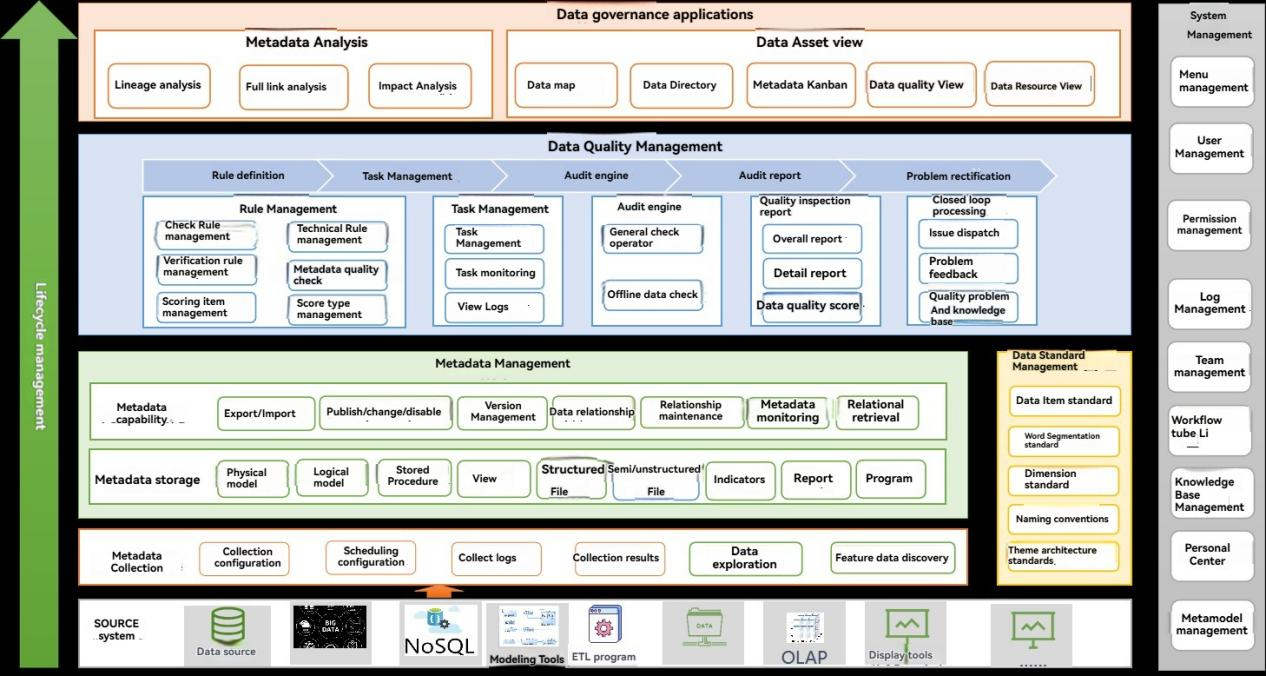Project Background:
With the development of Internet finance and big data technology, the digital transformation of the banking industry continues to deepen. While expanding its business territory, ICBC faces core challenges such as data standards implementation, cross-system data quality control, and centralized metadata management. To this end, the bank commissioned Wisdom Creative to build a data governance control platform that integrates the three functions of data quality monitoring, data standard management, and metadata governance, and to construct a data management system that covers the entire bank. The platform ensures that all bank staff can accurately obtain the required data services in a timely manner during the business process and effectively improves the overall data governance efficiency by bridging the organic collaboration among staff, data and business systems.
Technical Implementation Program:
Based on the construction idea of data-based transformation, the data governance project of ICBC mainly focuses on the construction of data centers for data governance, ETL, service openness, data security and other application scenarios. It organically integrates the functions of the data base platform such as collection, processing, storage, control and analysis, and graphically manages the functions provided by the base platform according to the bank's stock system and the existing data architecture, providing a reliable and business-independent "collection, processing, storage, management and distribution" solution to provide all-round information resource service support for the application business. It provides a reliable and business-independent "collection-processing-storage-management-distribution" solution, and provides a full range of information resource service support for application business.

Program Highlights:
The ICBC Data Governance Project is driven by digital transformation to build an intelligent data management system and promote data assetization transformation. The project empowers the three major areas of real economy, financial inclusion and risk control through digital innovation, and realizes the leap from data management to data asset operation. In concrete implementation, the project has formed three core achievements: at the data level, it has opened up the entire process of data standards, metadata and quality management, and completed the landing of the standard system and automated verification; at the technical level, it has built a governance framework that meets the characteristics of the financial industry, and realized the digital transformation of the industry's governance norms; and at the implementation level, it has formed a reusable methodology for the construction of banking data standards and quality management, and has provided practical experience for the same industry to learn from. The implementation level forms a reusable banking data standard construction and quality management methodology, providing practical experience for the industry.
Construction effectiveness:
1. Multi-source data integration hub By constructing a domain-wide data hub, we have completed the metadata governance of 17 heterogeneous business systems (29,786 items in total), formed 1,395 standardized data entities and 372 common coding specifications, and innovatively deployed 1,745 quality checking rules to build a credible data base to support the intelligent risk control system, business model innovation, and decision support system.
2. Full Life Cycle Management System We have built a multi-level management system with "four synergies" (standardization, process consolidation, intelligence drive and system integration) to realize the full-link control of data assets. Optimize the data topology through architecture governance, ensure the visualization of the governance process by relying on the process engine, and establish a knowledge inheritance mechanism to promote the continuous precipitation of knowledge assets.
3. Intelligent Data Operating System Innovative restructuring is implemented at the infrastructure level to build a data center operating system (DCOS) with platformization capabilities. By abstracting the data service layer, the platform realizes the paradigm shift of data governance capability from basic control to intelligent operation, and completes the technological evolution of leapfrog upgrade from traditional mode to intelligent platform.